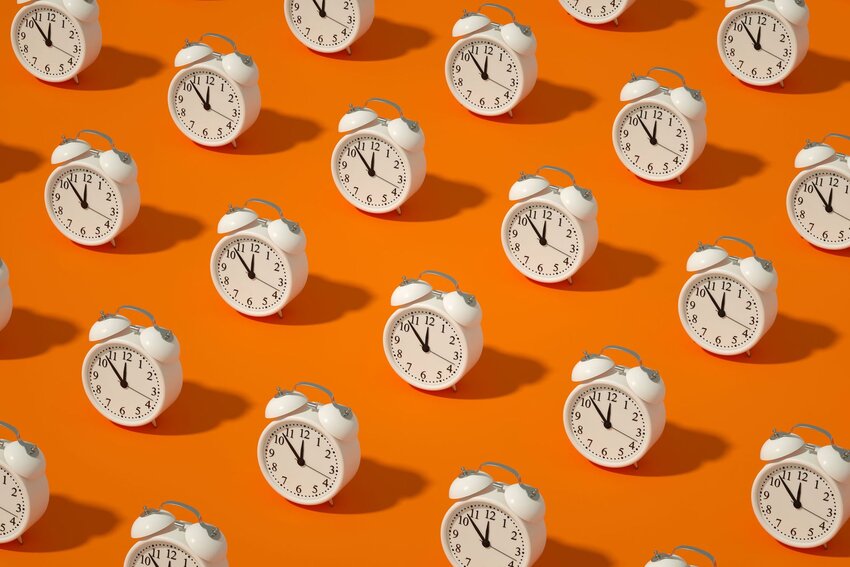Whether it’s the calendar, the clock, the tides, or the rising and setting of the sun, most of our lives are structured around the passing of time. So it makes sense that the concept of time is woven into many idioms and phrases across virtually every language. In English, we reference time in expressions like "in a jiffy" and "once in a blue moon." But how much time do these phrases refer to? We say, "it's about time" to learn more about these sayings.
In A Jiffy
To do something “in a jiffy,” is generally understood to be very fast. But this figurative idiom is rooted in the sciences, where a “jiffy” is a concrete, measurable unit. It’s used by scientists in different ways to denote a very, very tiny amount of time. For physicists, it indicates how long it takes for light to travel one femtometer (a millionth of a millionth of a millimeter). A “jiffy” is also used by electrical engineers to measure the length of a single cycle of alternating current where it equals 17 milliseconds. In computer science, it’s variable; a jiffy equals one to 10 milliseconds.
In the Nick of Time
Something happening at the very last possible moment is a good way to describe this idiom. The saying goes back to the 16th century when the Tudors reigned in England. A “nick” was a small notch or cut used to portray extreme precision at the time (typically on measuring sticks or in tally marks). So, something happening in a "nick" would mean it happened very close to the beginning. Before the 16th century, the phrase “pudding time” was used instead of “in the nick” because pudding (a savory dish of meat) was the first portion served during Medieval meals. Eventually, pudding (in Great Britain at least) came to connote sweet dishes served last (dessert), so the saying was changed to “in the nick.”
A Whale of a Time
Having a “whale of a time” suggests that someone is greatly enjoying themselves. This saying doesn't refer to a specific unit of time, but rather explains the quality of time. The origins of this idiom are murky, but it’s been around for a few centuries. It likely came from seafaring whalers, who began using the term to describe anything unusual or grand (referencing the lore surrounding whales). The idiom began popping up at the end of the 19th century to describe someone exceptionally skilled or brilliant, as in, “She’s a whale in chemistry.” It was also used to describe something very large, as in, “a whale of a crowd,” or finally, something very cheery — “a whale of a time.”
In a Few Shakes
“Be back in a shake” isn’t just an idiom; it’s a real unit of measurement, just like the “jiffy.” In physics, a "shake" is the unit of time used to measure the one step of a nuclear chain reaction. This equals 10 nanoseconds (10 billionths of a second). So technically, it would be impossible for a human to do anything "in a few shakes,” but it’s understood that it's going to be quick.
Turn Back the Hands of Time
Gen Z might be a little fuzzy on this one, but this idiom has been used in songs, movies, and other pop culture references for decades. It refers to an analog clock with a face and hands. The pointers that move around the face of a clock are called “hands,” so, turning back the “hands of time” metaphorically means to go back in time.
The Crack of Dawn
This 19th-century saying originated as “at the crack of day,” which would refer to something happening very early in the morning, if not at the exact moment the sun rises. The symbolism in this idiom refers to the thin line of sunlight that appears to make a bright crack in the sky as the sun appears over the horizon.
Once in a Blue Moon
“Once in a blue moon” means it happens incredibly rarely. Someone using the idiom likely doesn’t know exactly how rare that is, but astronomers could calculate it. A “blue moon” is a special type of full moon that happens once every two or three years when a single month has two full moons. That rare, second full moon is the “blue moon.” The idiom as it’s used today was first published in an 1821 book called Real Life in London by Pierce Egan. The line was, “How’s Harry and Ben? – haven’t seen you this blue moon” — a usage very similar to what we might say today.
Featured image credit: akinbostanci/ iStock

